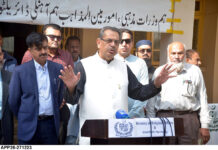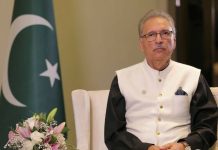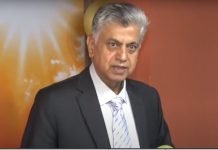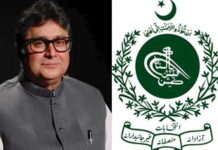
“The entire country will be our war zone,” he told reporters at a press conference in Peshawar.
The JUI-F leader has announced to set out on a long march against the government on October 27 that will culminate in the capital, where the party plans to hold a sit-in.
“Our strategy will not remain stagnant. We will keep changing it to cope with [any] situation,” he said. He insisted that a “flood of people from all over the country” was coming to join the march and the “fake rulers will drown in it like a straw”.
When asked whether he has been able to garner the support of other opposition parties, he said that he “hope(s) to see them” in the march. He added that since all opposition parties agreed that last year’s general elections were “fake” and that a reelection should be held, they should all be “on the same page and same stage”.
Both PPP and PML-N – the two major opposition parties – have been non-committal on the issue of participation in the march. The PML-N had urged Fazl to delay the march, while PPP chief Bilawal Bhutto-Zardari had yesterday said that he would hold a party meeting to decide “the extent to which [they] can help” Fazl.
The PPP had expressed unwillingness to participate in the anti-government movement because of the inclusion of the issues of blasphemy laws and Namoos-i-Risalat on its agenda. Moreover, both the PPP and the PML-N had also opposed the idea of holding an indefinite sit-in, as the PTI did in 2014.
Fazl, in his press talk on Saturday, said that while he was not afraid of being arrested, such a move would fan the protesters’ anger against the government.
In response to a question about the government’s claim that the JUI-F chief was “using” children studying in seminaries against the government, Fazl alleged that the rulers were trying to deny the students their democratic right.
Moreover, he claimed, the proportion of seminary students would be minimal, as people from every walk of life were joining the march.
According to reports, Prime Minister Imran Khan, during a meeting the other day, had lamented that Fazl was using innocent children of seminaries against the government, but he [JUI-F chief] should realise that after the victory of the government’s stance on the Kashmir issue in the recently held United Nations General Assembly session, he would not be able to exploit the “religious card”.
“By taking up the madrassa issue, you (government) want to garner international support,” Fazl said on Saturday.
“The prizes you (prime minister) distributed among students of seminaries was an attempt to counter us but it was in vain.”
He urged the “establishment, bureaucracy and police not to back this illegitimate government and distance themselves from it”.
“We have stated our policy. We do not want to clash with institutions, that we want to respect them.
“But if the institutions adopt a policy to clash with the people, then, if these institutions suffer damage in future, whose fault will it be?”
When asked if he thought that the “selectors” were disappointed in the current government, Fazl said: “That would be in accordance with human nature. Our institutions should be tired and disappointed […] but it surprises me that even after such obvious failures and crises they (institutions) insist that they will back this government.”
The JUI-F chief denied that there was any similarity between the sit-ins held by the now-ruling Pakistan Tehreek-i-Insaf, Pakistan Awami Tehreek’s Tahirul Qadri and Tehreek-i-Labbaik Pakistan’s Khadim Rizvi, saying he was leading a march for the “independence” of the public.
He was visibly annoyed when asked if the party was collecting donations for its march and said: “Why wouldn’t we? It is our right, where else will we get money from? Why is there so much noise over this?
“We are not being funded by any western country. We are asking our workers, friends.”
Fazl, during his press conference, also criticised the government’s plan for educational reforms in the country after launching into an anti-Semitic attack against prominent billionaire investor and philanthropist George Soros.
He alleged that the government’s “agenda” was to “make Pakistan’s educational system subservient to the West”.
“We know who he [Prime Minister Imran] met in New York,” Fazl said. “[He met] George Soros, who runs an NGO and distributes funds all over the world in the garb of bringing about educational reforms. By meeting that infamous Jew, [the government] has made it clear that they don’t want to bring reforms in religious education. They want to make Pakistan’s educational system subservient to the West.”
Fazl went on to accuse the prime minister of meeting people who “conspire against other countries”.
“They [the government] befriend such conspirators, who are Jewish, and then tell us they want to reform the education system,” he declared.













